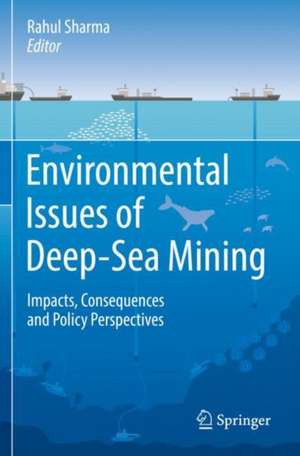Environmental Issues of Deep-Sea Mining: Impacts, Consequences and Policy Perspectives
Editat de Rahul Sharmaen Limba Engleză Paperback – 15 aug 2020
Section 1 highlights the various environmental issues and discusses methods and approaches that can help in developing environmentally sustainable deep-sea mining.
Section 2 details the results and outcomes of studies related to impact assessment of deep-sea mining, and proposes methods for monitoring.
Section 3 discusses the need and means for developing data standards and their application to deep-sea mining.
Section 4 discusses the policies, approaches, and practices related to deep-sea mining, suggests formats for developing environmental impact statements (EIS) and environmental management plans (EMP), and describes national and international regulations for environmental management.
Section 5 concludes the text by putting deep-sea economic activities into an environmental context and conducting techno-economic analyses of deep-sea mining and processing.
| Toate formatele și edițiile | Preț | Express |
|---|---|---|
| Paperback (1) | 807.45 lei 38-45 zile | |
| Springer International Publishing – 15 aug 2020 | 807.45 lei 38-45 zile | |
| Hardback (1) | 826.77 lei 38-45 zile | |
| Springer International Publishing – 15 mai 2019 | 826.77 lei 38-45 zile |
Preț: 807.45 lei
Preț vechi: 1062.43 lei
-24% Nou
Puncte Express: 1211
Preț estimativ în valută:
154.54€ • 160.73$ • 129.51£
154.54€ • 160.73$ • 129.51£
Carte tipărită la comandă
Livrare economică 10-17 martie
Preluare comenzi: 021 569.72.76
Specificații
ISBN-13: 9783030126988
ISBN-10: 3030126986
Pagini: 577
Ilustrații: XVII, 577 p. 217 illus., 182 illus. in color.
Dimensiuni: 155 x 235 mm
Ediția:1st ed. 2019
Editura: Springer International Publishing
Colecția Springer
Locul publicării:Cham, Switzerland
ISBN-10: 3030126986
Pagini: 577
Ilustrații: XVII, 577 p. 217 illus., 182 illus. in color.
Dimensiuni: 155 x 235 mm
Ediția:1st ed. 2019
Editura: Springer International Publishing
Colecția Springer
Locul publicării:Cham, Switzerland
Cuprins
PartA: Environmental issues.- Chapter1: Deep-sea mining and environment – an introduction.- Chapter2: Environmental issues of deep-sea mining – a global perspective.- Chapter3: Environmental impacts of nodule, crust and sulphide mining – an overview.- Chapter4: Towards an ecosystem approach to environmental impact assessment for deep-sea mining.- Chapter5: Technologies for Safe and Sustainable Mining of Deep-Seabed Minerals.- PartB: Environmental impact assessment.- Chapter6: Assessment of deep-sea faunal communities - indicators of environmental impact.- Chapter7: Long term monitoring of environmental conditions of benthic impact experiment.- Chapter8: Metal mobility from hydrothermal sulfides into seawater during deep seafloor mining operations.- Chapter9: Mining in hydrothermal vent fields: predicting and minimizing impacts on ecosystems with the use of a mathematical modeling framework.- Chapter10: Ecotoxicological bioassay using marine algae for deep-sea mining.- PartC: Environmental data standardization and application.- Chapter11: New techniques for standardization of Environmental Impact Assessment.- Chapter12: Environmental factors for design and operation of deep-sea mining system - based on case studies.- PartD: Environmental management.- Chapter13: Environmental Policy for Deep Seabed Mining.- Chapter14: Ecosystem approach for management of deep-sea mining activities.- Chapter15: Improving environmental management practices in deep-sea mining.- Chapter16: The development of Environmental Impact Assessments for deep-sea mining.- Chapter17: Protection of the marine environment: The international and national regulation of deep seabed mining activities.- PartE: Economic Considerations.- Chapter 18: Deep sea natural capital: putting deep see economic activities into an environmental context.- Chapter19: Review of mining rates, environmental impacts, metal values and investments for polymetallic nodules mining.- Chapter20: Techno-economic perspective on processing of polymetallic ocean nodules
Notă biografică
Dr. Rahul Sharma (retired) was a Chief Scientist at the National Institute of Oceanography in Goa, India. He received his PhD in Marine Science from Goa University in 1997. His research interests include development of underwater photography for deep-sea exploration, environmental impact assessment for deep-sea mining, and application of environmental data for deep-sea mining and environmental conservation. He is the editor of the book on 'Deep-sea mining: resource potential, technical and environmental considerations' published by Springer in 2017 and has undertaken several assignments for international research organizations, academic institutions and the International Seabed Authority.
Textul de pe ultima copertă
This volume discusses environmental issues associated with deep-sea mining, with an emphasis on potential impacts, their consequences and the policy perspectives. The book describes the methods and technologies to assess, monitor and mitigate mining impacts on marine environments, and also suggests various approaches for environmental management when conducting deep-sea mining. The volume brings together information and data for researchers, contractors, mining companies, regulators, and NGOs working in the field of deep-sea mining.
Section 1 highlights the various environmental issues and discusses methods and approaches that can help in developing environmentally sustainable deep-sea mining.
Section 2 details the results and outcomes of studies related to impact assessment of deep-sea mining, and proposes methods for monitoring.
Section 3 discusses the need and means for developing data standards and their application to deep-sea mining.
Section 4 discusses the policies, approaches, and practices related to deep-sea mining, suggests formats for developing environmental impact statements (EIS) and environmental management plans (EMP), and describes national and international regulations for environmental management.
Section 5 concludes the text by putting deep-sea economic activities into an environmental context and conducting techno-economic analyses of deep-sea mining and processing.
Section 1 highlights the various environmental issues and discusses methods and approaches that can help in developing environmentally sustainable deep-sea mining.
Section 2 details the results and outcomes of studies related to impact assessment of deep-sea mining, and proposes methods for monitoring.
Section 3 discusses the need and means for developing data standards and their application to deep-sea mining.
Section 4 discusses the policies, approaches, and practices related to deep-sea mining, suggests formats for developing environmental impact statements (EIS) and environmental management plans (EMP), and describes national and international regulations for environmental management.
Section 5 concludes the text by putting deep-sea economic activities into an environmental context and conducting techno-economic analyses of deep-sea mining and processing.
Caracteristici
Discusses issues related to potential environmental impacts associated with deep-sea mining Addresses the requirements for proper environmental management for sustainable deep-sea mining Presents information and data from global experts for researchers, contractors, mining companies, regulators, and NGOs
